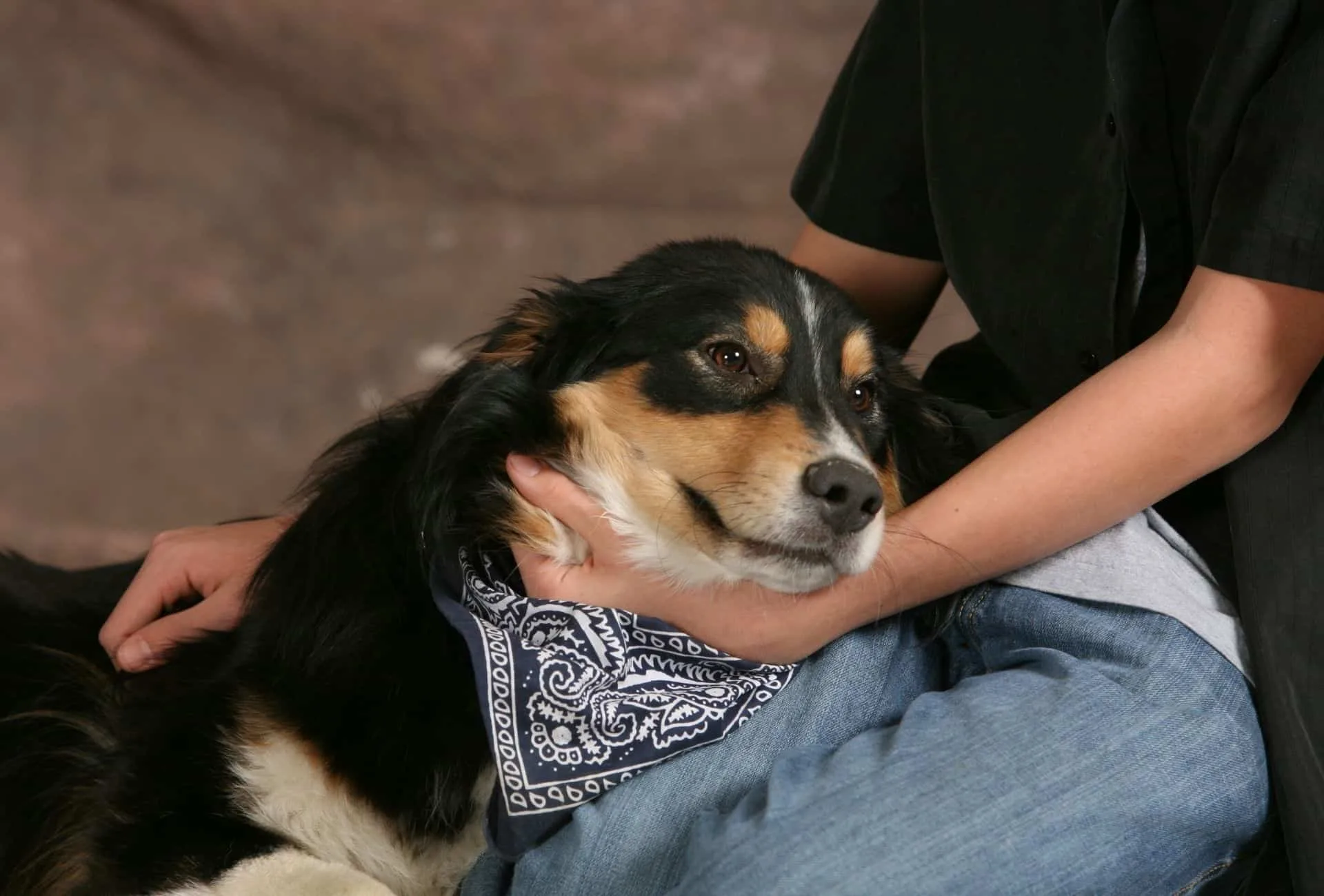Everybody has an opinion on this matter.
Some people believe mutts are the ultimate health beasts while others insist only purebreds should be allowed to breed.
To clarify, this article is not about whether or not purebreds are “better” dogs than crossbreeds.
Rather, it’s about which dogs are healthier.
If you want to buy a health-tested purebred puppy from a responsible breeder, go ahead.
Wanna rescue a mutt from your local shelter? That’s awesome too.
The fact that many dog owners fail their furry companions in many respects does not degrade any kind of dog and they can all make great lifelong companions.
For the sake of this article crossbreed, mixed breed, designer dogs – all this refers to one purebred crossed with another purebred as well as the cross of mixed breed dogs.
Technically, the term hybrid would be used to describe a cross between certain species, but who’s arguing semantics here?
Let’s try to shine some light on this and investigate whether or not the intentional breeding of mixed breeds is ethical or even the better choice.
Largest-Ever Study – What The Science Really Says
Even though the canine is our so-called “best friend”, there has been little reliable research on key areas such as temperament or genetics.
You’ll see shortly why I said “reliable”.
The biggest venture into this minefield has been undertaken by the University of California-Davis which has investigated over 100,000 purebreds & mutts over a 15-year period (1995-2010).

More than 27,000 of these dogs displayed one or more of the tested 24 genetic disorders.
The results?
- 13 out of 24 genetic disorders have a similar occurrence between crossbreeds and purebreds
- 10 out of 24 genetic disorders were more prevalent in purebreds
- 1 out of 24 genetic disorders were more prevalent in mixed breeds
So, crossbreeds are healthier, right?
Wrong.
A reader of this study might conclude this and checking the facts, it looks like that’s the case at first glance.
However, while some news outlets pump out headlines undoubtedly confirming that crossbreeds are healthier, others kinda bury the data and focus on the fact that over half of the genetic disorders occurred equally as common.
Even UC Davis itself states the following on their website as a headline in a 2013 article (emphasis mine).
“Purebred dogs not always at higher risk for genetic disorders, study finds”.
UC Davis
The AVMA also pulled up a part of this study and discussed it in a short article (emphasis mine).
The focus of this statement is on whether or not mixed breeds can be carriers of diseases which is a valid remark.
“There has been a long-standing perception that mixed breed dogs are less disease-prone than purebred dogs,” said Dr. Cindy Cole, general manager at Wisdom Health, in an announcement about the study. “This DNA-testing–based evidence shows that while mixed breed dogs are in fact less likely than purebreds to develop the recessive disorders evaluated in the study, they may still be carriers.”
AVMA
While 5 out of 100 purebreds were affected by one of the 152 diseases versus 2 out of 100 mixed breeds, there are actually 28 carriers among purebreds and 40 carriers among mixed breeds.
Facing this study’s overall findings, it seems that mixed breeds truly are healthier, but why are some sources not focussing on that?
In reality, the whole topic is far more complex, and more data could end up proving either one of the purebred or crossbreed camps right.
Why?
Well, the study did many things right. They accounted for age, body weight, and sex (including neutered/spayed) – all very important.
The sample size and duration of this study are also reliable.
Still, the results could heavily favor crossbreeds.
5 Reasons This Study Could Be Skewed Toward Crossbreeds
There are a couple of reasons that can potentially tip the scales in favor of mixed breeds.
While this study makes a great effort to understand predispositions of genetic health disorders and tries to compare crossbreeds to purebreds, some aspects would make some statisticians cry.
1. Purebreds are More Likely to Receive Veterinary Attention
There are many arguments for why it can generally be observed that mixed breeds receive less veterinary attention than their purebred counterparts.
It’s definitely not because mutt owners don’t love their dogs, they’re very much loved and cared for.
Here are the reasons why purebreds tend to receive better veterinary attention:
Strays are often mixed breeds and rescue dogs are rarely screened until something happens in their senior years. Furthermore, irresponsible designer dog breeders often don’t perform health testing.
The fact that mixed breed breeders skip health testing is underlined by the fact that it often wouldn’t make sense to do so from an economical standpoint.
You can’t register them with the AKC anyway and owners are ready to pay top dollar for what is essentially a mutt in some beautiful color, so why bother?
While supply and demand may rule the economic world, a poorly socialized and non-health tested merle, lilac, or fancy cream flat-nosed French Bulldog isn’t proper breeding and it certainly doesn’t justify $3,000+.
2. Distribution Among Population Unclear
It’s not clear how many dog owners in the U.S. alone call a mixed breed their own vs. how many people own purebreds.
Even if there was such a country-wide registry, this doesn’t account for millions of stray dogs who often end up in shelters, making some of them part of these statistics sooner or later.
The ASPCA estimates 3.3 million dogs enter the shelter system each year, among them stray dogs.
Countless more dogs live on the streets without us knowing about it.
Texas’ Houston alone has over 1 million stray dogs.
Worldwide? Don’t get me started. The WHO estimates around 200 million stray dogs worldwide.
This part of the initial UC-Davis study refers to the distribution:
Mixed breed dogs represent a substantial part of the canine population in several countries such as in the United States (US) where 47% of households surveyed in 2014 reported having a mixed breed dog (5).
Study: Frequency and distribution of 152 genetic disease variants in over 100,000 mixed breed and purebred dogs
However, this is just a simple survey and not reliable enough to make confident estimates.
Without accurate data, one can’t just assume that the distribution among the population is 50/50.
If there are more purebreds than mixed breeds, of course, there’ll be more genetic diseases prevalent in purebreds (the same applies vice versa).
3. Small Gene Pool
Naturally, the gene pool among many of the rare breeds is pretty small.
While the AKC publishes a yearly list of the most (and least) popular breeds in the US, there’s no data on how many dogs from each breed were registered.
However, I think an argument could be made that the top 10 breeds in the US account for a sizeable chunk of overall registrations.
What do some puppy mills and backyard breeders do to popular breeds when certain rare appearances or rare colors are in demand?
Inbreeding.

To make matters with small gene pools worse, many purebred breeders utilize inbreeding in their breeding program.
This not only applies to rare breeds but sometimes even popular ones like Golden Retrievers and Labrador Retrievers.
Contest winners want to commoditize their dog’s champion titles, in very sad and twisted ways.
With the Cane Corso, you can see many of the contest-winning breeders in Europe inbreeding their dogs to distant cousins or sometimes even siblings.
Not only is this questionable from an ethical standpoint, but it’s also highly probable that they’ll carry more genetic diseases.
In that sense, mixed breeds can be healthier because even though they may be carriers of genetic disorders and inbreeding definitely can’t be ruled out, it’s very sad to see worse breeding from people who theoretically should try to advance a certain breed.
4. Handful of Breeds Bump Purebreds To Top
If you have some breeds that are known to have predispositions for certain conditions, it’s more likely that these breeds will take the top spot away from crossbreeds.
The data also indicated that the more recently derived breeds or those breeds that shared a similar lineage were more susceptible to certain inherited disorders. For example, four of the top five breeds affected with elbow dysplasia were the Bernese mountain dog, Newfoundland, mastiff and Rottweiler – all from the mastiff-like lineage. This suggests that these breeds share gene mutations for elbow dysplasia because they were descended from a common ancestor.
CABI (Centre for Agriculture and Bioscience International)
All these breeds’ genetic issues with elbow (and often hip) dysplasia could be partly prevented with proper selection and health testing.
Rottweilers, Newfoundlands, Mastiffs, and Bernese Mountain dogs – they’re all pretty heavy breeds and overly burdened with these issues.
Other genetic diseases are overly prevalent in other breeds, thus increasing the likelihood of landing a top spot if you check many of the disease-specific vet centers where you’ll find many affected purebreds.
In part, this problem ties back to the issue of small gene pools.
5. Takes Poor Breeding into Account
This is probably the greatest fallacy of this study.
Perhaps it’s not so much a fallacy of the study itself but what people conclude from that.
When I’m advocating to stop breeding mixed breed dogs, I’m assuming that potential puppy owners are looking for responsible breeders.
Sure, mixed breed owners can perform health tests too and make sure that the Poodle, as well as the Golden Retriever, are healthy respectively.
However, mixing two breeds still introduces the risk of combining two different sets of genetic disorders and why should you take that risk?
Also, once second-generation designer dogs begin (Goldendoodles crossed with Goldendoodles or something else), it gets harder and harder to trace the ancestry line.
Not only will you get a gamble in terms of temperament, but you’ll also nearly always introduce unnecessary health risks.
Qualities of many of the purebreds are fairly known upfront if a pairing is carefully selected and there’s a purebred for nearly all purposes.
I have yet to encounter a responsible breeder who breeds mixed breeds, not to say that they’re bad people but many just don’t know what they’re doing and mix their dog with the neighbor’s mutt just because “he’s friendly”.
There’s so much more to proper breeding than a single trait or even something shallow like appearance.
That being said, of course, there are irresponsible breeders for purebreds too.
To conclude this part, it’s essential to choose a breeder who offers and displays: a proper breeding program, knowledge of socialization, health testing on all dogs, honesty, and help with selecting a puppy.
Mixed Breed Vs. Purebred – Quick Answers
There are a couple of common questions that always arise when people debate purebred vs. mixed breed and I’m always trying to give food for thought.
Many answers depend on opinion, especially when there’s just not enough scientific data to suggest one is right and the other is totally wrong.
So let’s dive in.
Are mixed breed dogs smarter than purebreds?
This is a generalisation and I definitely wouldn’t say it’s true.
It also depends on how you define “smart”.
Emotionally smart, able to learn quickly and memorize lots of commands, being easy to train for house manners, etc.
Most working dogs on the police force and in the military service are purebred.
The same applies to protection dogs with breeds like the German Shepherd or Rottweiler.
Agility, flying Dog Discs, and dog dancing are also dominated by breeds like the Border Collie, Australian Shepherd, and Poodle.
However, lots of mutts work on movie sets, as therapy dogs, and sometimes even guide dogs (although many breeding programs also use predominantly Golden Retrievers).
Do mixed breed dogs live longer?
There’s no data to support that assumption.
Lifespan varies greatly by breed, exercise, diet, genetics, and so much more.
You may have encountered a mixed breed dog who got 15, 17, or even 19 years old, and diet, exercise, etc. certainly play a major role.
However, personal anecdotes don’t replace a large-scale scientific study.
If everything’s optimized and it’d turn out that one is truly healthier than another, then the mixed breed (or perhaps purebred) can definitely live longer on average without nasty genetic diseases.
As mentioned, this is not the case though.

Why are purebred dogs so expensive?
Depending on the breed, where you live, and what you’re planning to do with your pup, a healthy puppy from a responsible breeder can definitely cost anywhere between $1,500-$3,000.
Finding a sire or dam as a breeding partner requires time and knowledge, the same goes for socialization.
Puppies need lots of enrichment, trips to unknown places once they’re old enough, not to mention vaccinations and high-quality food.
Having the vet do health tests and check-ups, and helping with the delivery, all of that costs money and at the end of the day, you get what you pay for.
What do you want – $2,000 now and manageable health bills when your dog’s a senior or a senior dog that costs you thousands, if not tens of thousands, of dollars?
Apart from the fact that avoiding your dog’s suffering is priceless.
Shouldn’t you rescue a dog?
If you want to, rescuing a dog is awesome and I have an article on how to find the best rescue dog for your lifestyle and filter out any bad eggs among the rescue organizations.
However, don’t let others guilt-trap you into thinking getting a pup from a responsible breeder is selfish.
You’re not here to clean up the mess other people make regularly but if you want to, kudos to you.
However, when you rescue a dog with too big expectations, you’re setting yourself up for failure.
Many of these dogs had a hard life and require time, training, and understanding (but then again, so do puppies, it’s just different).
If you’re planning to use your dog as a therapy dog or whatnot, a rescue can do the trick but I’d always feel safer knowing exactly what the dog went through in his life, how he handles the oddest situation possible, and so on.
Why do so many assume mixed breeds are healthier?
Quite frankly, there’s a lot of poor breeding done with purebreds out there and that’s a huge problem in and of itself.
From puppy mills and pet stores to irresponsible backyard breeders, who suffers in the end? Dogs.
That being said, many rescues guilt-trap people into buying a rescue just so they can go through ridiculous screening processes (where a garden is a k.o. criteria to get a dog, no matter what breed) and sit on their high horse.
Breeders have equally strong voices postulating that their current litter is the second coming of Christ.
Always do your own research and don’t rely on the opinions of aficionados.
What You Can Do
The same companies that are offering breed identification kits sometimes offer DNA health testing too.
They just compare genetic markers with the data they’ve collected on hundreds of genetic diseases and give you a rundown of the likelihood that your dog can get any of them.
Nothing of this is 100% certain but data like this could prove extremely valuable for any future studies if it’s used in the right way besides, who doesn’t want to know what their dog’s up against?
If everything’s good, perfect.
If there’s an issue or predisposition for a certain disease, don’t panic.
Nothing is certain and your dog might never be affected by any certain genetic defect but you can still take preventative measures.
